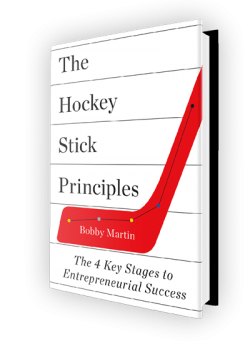There is no “right” age to start a startup because every situation is different and the skills required to build a startup are wide-ranging. However, that’s only part of the story. Practically speaking, starting at company between 25 and 30 makes good sense. According to my Hockey Stick Research Study, the average age for founders of successful startups age was 32. Another study in the Harvard Business Review reported the average age was just over 31 for founders who were VC-backed and had startups valued at $1 billion or more. Jeff Bezos started Amazon when he was 30. Jack Dorsey launched Twitter when he was 30.
5 reasons that ages 25 to 30 win the battle
- My Study shows that 25 to 30-year-olds perform better: This chart shows the revenue for 172 successful startups. During the first three years, the 25 to 30-year-olds may have gotten off to slower starts, but they finished much stronger growing to 65 percent larger by their seventh year.
| Age | Year 1 | Year 2 | Year 3 | Year 4 | Year 5 | Year 6 | Year 7 |
| 25 to 30 | $500 | $323,500 | $868,479 | $3,855,000 | $8,700,000 | $22,370,000 | $25,860,000 |
| All other | $138,000 | $554,000 | $1,600,000 | $3,200,000 | $5,741,341 | $10,785,000 | $15,730,000 |
- A low overhead vs experience ratio: A key factor determining how long a startup can survive while it figures out its business model (which often takes years) is how much personal overhead founders must spend each month to remain afloat. When I started First Research, I was 29 years old, and my personal overhead was $2,265/month. I could have lasted practically forever on that low a salary requirement by waiting tables at night if I needed to. Today, I’m an angel investor and invest in startups that have founders well into their 30s and 40s who need $10,000+ in personal monthly overhead because they have families and a lifestyle that demands it. It’s difficult to budget down from $10,000 to $2,500. Really hard. The extra $7,500 per month (or twice that if you have a cofounder) clearly hurts your chances of survival.
- 25 to 30-year-olds can “refuel”: I recently told an MBA class at Georgetown that I’m not sure I could start First Research again because, as I put it, “I’ve lost the ability to refuel.” What I meant is that when you start a business it takes a boatload of physical, mental, and emotional energy so you need all the energy you can get. Today, I’m 47 and have a young family with lots of distractions I didn’t have when I was 29. I’ve lost the ability to refuel each evening by resting and doing what I love to do such as playing sports, catching up with friends, or watching movies. After work these days, I discipline kids, help them with homework, manage contractors, and do other “grown-up” stuff. Quite frankly, all this catches up with you, and you lose the necessary passion and energy to work extremely hard at building a new company.
- Those 25 and younger have energy, but lack business savvy: In 1999, rock band Blink 182’s song says that “Nobody likes you when you’re twenty-three.” They really do sorta have a point. Those 25 and younger are overall more naïve. Nothing wrong with that, but many aren’t quite ready for the complexity involved with managing a growing startup. Managing people, making financial decisions, and building the marketing machine necessary to create a profitable business operation is no joke.
- It’s easier to land investment: A 2014 New Republic article about ageism in Silicon Valley quotes famous venture capitalist Paul Graham: “The cutoff in investors’ heads is 32. After 32, they start to be a little skeptical.” The average age of founders accepted to the elite Y-Combinator accelerator/funder was 26. Michael Moritz of Sequoia Capital told Time magazine that those in their mid- to late-twenties “see no boundaries, see no limits, see no obstacle that they can’t hurdle.” [i] And Mark Zuckerberg once said in a speech that young people are smarter. I don’t believe that, but perception becomes reality for investors. Let’s face it– there’s age bias amongst investors that old-school people don’t make great entrepreneurs.
In 2011, this Techcrunch article made a strong argument using scientific data against ageism when it comes to founding a startup. So don’t get down if you aren’t 25 to 30 years old. There are plenty of successful founders outside that bracket. But I’m just saying.
[i] http://business.time.com/2013/03/14/ask-the-expert-the-best-age-for-a-start-up-founder/
Sign up to get more great insights directly to your inbox.
As a special bonus, you'll also immediately get access to my inside analysis of what made 172 diverse companies achieve take-off revenue growth.

